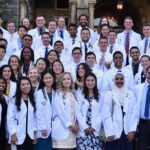Georgetown University School of Medicine (GUSOM) is one of the most prestigious medical schools in the United States. Known for its rigorous curriculum, strong emphasis on ethics, and commitment to service, the institution attracts thousands of applicants every year. However, a recurring trend has caught the attention of prospective students and pre-med communities: Georgetown seems to interview a disproportionately high number of applicants with stellar GPAs and MCAT scores.
Is this a deliberate strategy? Why does Georgetown Medicine interview so many high-stat applicants? In this article, we’ll delve into the admissions process at GUSOM to uncover the truth behind their selection criteria.
Understanding Georgetown Medicine’s Admissions Process
Like most medical schools, Georgetown employs a holistic admissions process. This means they evaluate candidates based on multiple factors, including academics, extracurricular activities, personal statements, and interviews.
However, while holistic review suggests that no single factor dominates, statistics indicate that high-GPA and high-MCAT candidates receive a significant portion of interview invitations. Here’s why:
- Initial Screening: Due to the volume of applications, Georgetown likely uses GPA and MCAT scores as an initial filter to manage the applicant pool.
- National Competitiveness: The medical school landscape is becoming increasingly competitive, and high stats are often a reflection of strong academic preparation.
- Reputation and Rankings: Medical schools, including Georgetown, consider their US News & World Report ranking, which can be influenced by the average academic metrics of accepted students.
The Emphasis on High-Stat Applicants
Maintaining Reputation and Academic Excellence
One of the key reasons Georgetown interviews so many high-stat applicants is to ensure its incoming class remains academically competitive. Admitting students with strong numbers helps the institution maintain a high average GPA and MCAT score, which in turn reinforces its prestige.
Historical Trends in Admissions
An analysis of previous admissions cycles suggests that GUSOM consistently interviews and admits students with top-tier academic records.
- In past years, the average GPA of admitted students hovered around 3.7-3.8, with MCAT scores in the 510-515 range.
- The school receives over 10,000 applications annually, making it necessary to prioritize those who statistically stand a better chance of handling the rigorous medical curriculum.
- Schools with higher-ranked applicants tend to maintain a lower attrition rate, which is beneficial for long-term academic outcomes.
Competition with Peer Institutions
Medical schools compete for the best students, and Georgetown is no exception. By prioritizing high-stat applicants, the school ensures it attracts students who might also be considering other top-tier institutions like Johns Hopkins, Harvard, or Columbia.
Does High-Stat Mean Automatic Acceptance?
While a high GPA and MCAT score increase the chances of receiving an interview, they do not guarantee admission.
Interview-to-Acceptance Ratio
- Many high-stat applicants receive interviews but are later rejected.
- Georgetown’s secondary application and interview play a crucial role in final admissions decisions.
Beyond the Numbers
Here are some common reasons why high-stat applicants might be rejected:
- Weak secondary essays: Generic responses fail to demonstrate alignment with Georgetown’s mission.
- Lack of clinical experience: High scores alone don’t compensate for missing hands-on experience in patient care.
- Interview performance: Some applicants may struggle to effectively communicate their passion for medicine.
Georgetown’s Jesuit Values and Holistic Review
Georgetown University is a Jesuit institution, which means it places a strong emphasis on ethics, service, and social justice. The school seeks students who embody these values, and while high academic performance is important, other factors carry weight.
Does High-Stat Align with Georgetown’s Mission?
Not necessarily. The admissions committee considers:
- Commitment to service and patient care.
- Strong leadership and advocacy roles.
- Alignment with Georgetown’s emphasis on ethics and social responsibility.
Applicants who showcase these qualities alongside strong academic metrics have a higher chance of securing an acceptance.
How to Stand Out Beyond High Stats
If you’re applying to Georgetown Medicine, it’s important to focus on more than just numbers. Here are some ways to enhance your application:
Strengthen Your Secondary Application
- Be specific about why you chose Georgetown. Avoid generic statements—mention the school’s unique programs or mission.
- Highlight service-oriented experiences. Discuss volunteer work or community involvement that aligns with the school’s values.
Showcase Clinical and Research Experience
- Work in a hospital or clinic setting. Hands-on experience demonstrates readiness for patient care.
- Participate in research projects. Georgetown values applicants who contribute to the medical field through research.
Ace the Interview
- Prepare for ethical questions. Georgetown emphasizes ethics and service, so be ready to discuss medical dilemmas.
- Practice storytelling. Strong applicants connect their experiences to Georgetown’s mission.
Conclusion
Georgetown University School of Medicine interviews a high number of high-stat applicants because of its commitment to academic excellence, competitiveness, and reputation. However, strong numbers alone do not guarantee acceptance. The school seeks well-rounded individuals who align with its Jesuit values, mission-driven approach, and commitment to service.
For aspiring applicants, it’s crucial to go beyond stats and demonstrate a strong passion for medicine, leadership, and patient-centered care. By doing so, you’ll improve your chances of not just securing an interview, but also an acceptance letter from Georgetown.
For more expert insights on medical school admissions, visit MedSniff today!



